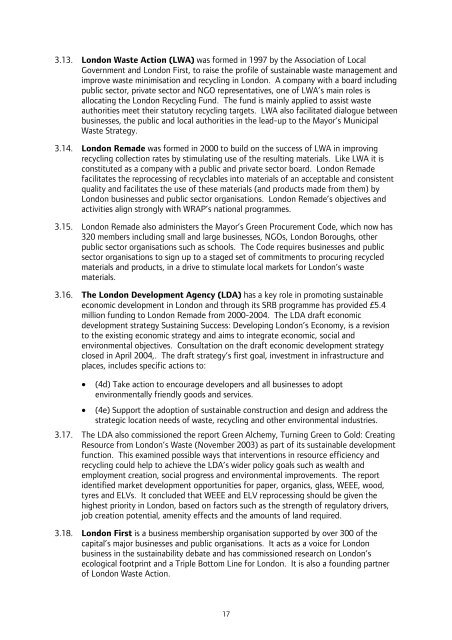London Wider Waste Strategy - London - Greater London Authority
London Wider Waste Strategy - London - Greater London Authority
London Wider Waste Strategy - London - Greater London Authority
You also want an ePaper? Increase the reach of your titles
YUMPU automatically turns print PDFs into web optimized ePapers that Google loves.
3.13. <strong>London</strong> <strong>Waste</strong> Action (LWA) was formed in 1997 by the Association of Local<br />
Government and <strong>London</strong> First, to raise the profile of sustainable waste management and<br />
improve waste minimisation and recycling in <strong>London</strong>. A company with a board including<br />
public sector, private sector and NGO representatives, one of LWA’s main roles is<br />
allocating the <strong>London</strong> Recycling Fund. The fund is mainly applied to assist waste<br />
authorities meet their statutory recycling targets. LWA also facilitated dialogue between<br />
businesses, the public and local authorities in the lead-up to the Mayor’s Municipal<br />
<strong>Waste</strong> <strong>Strategy</strong>.<br />
3.14. <strong>London</strong> Remade was formed in 2000 to build on the success of LWA in improving<br />
recycling collection rates by stimulating use of the resulting materials. Like LWA it is<br />
constituted as a company with a public and private sector board. <strong>London</strong> Remade<br />
facilitates the reprocessing of recyclables into materials of an acceptable and consistent<br />
quality and facilitates the use of these materials (and products made from them) by<br />
<strong>London</strong> businesses and public sector organisations. <strong>London</strong> Remade’s objectives and<br />
activities align strongly with WRAP’s national programmes.<br />
3.15. <strong>London</strong> Remade also administers the Mayor’s Green Procurement Code, which now has<br />
320 members including small and large businesses, NGOs, <strong>London</strong> Boroughs, other<br />
public sector organisations such as schools. The Code requires businesses and public<br />
sector organisations to sign up to a staged set of commitments to procuring recycled<br />
materials and products, in a drive to stimulate local markets for <strong>London</strong>’s waste<br />
materials.<br />
3.16. The <strong>London</strong> Development Agency (LDA) has a key role in promoting sustainable<br />
economic development in <strong>London</strong> and through its SRB programme has provided £5.4<br />
million funding to <strong>London</strong> Remade from 2000-2004. The LDA draft economic<br />
development strategy Sustaining Success: Developing <strong>London</strong>’s Economy, is a revision<br />
to the existing economic strategy and aims to integrate economic, social and<br />
environmental objectives. Consultation on the draft economic development strategy<br />
closed in April 2004,. The draft strategy’s first goal, investment in infrastructure and<br />
places, includes specific actions to:<br />
• (4d) Take action to encourage developers and all businesses to adopt<br />
environmentally friendly goods and services.<br />
• (4e) Support the adoption of sustainable construction and design and address the<br />
strategic location needs of waste, recycling and other environmental industries.<br />
3.17. The LDA also commissioned the report Green Alchemy, Turning Green to Gold: Creating<br />
Resource from <strong>London</strong>’s <strong>Waste</strong> (November 2003) as part of its sustainable development<br />
function. This examined possible ways that interventions in resource efficiency and<br />
recycling could help to achieve the LDA’s wider policy goals such as wealth and<br />
employment creation, social progress and environmental improvements. The report<br />
identified market development opportunities for paper, organics, glass, WEEE, wood,<br />
tyres and ELVs. It concluded that WEEE and ELV reprocessing should be given the<br />
highest priority in <strong>London</strong>, based on factors such as the strength of regulatory drivers,<br />
job creation potential, amenity effects and the amounts of land required.<br />
3.18. <strong>London</strong> First is a business membership organisation supported by over 300 of the<br />
capital’s major businesses and public organisations. It acts as a voice for <strong>London</strong><br />
business in the sustainability debate and has commissioned research on <strong>London</strong>’s<br />
ecological footprint and a Triple Bottom Line for <strong>London</strong>. It is also a founding partner<br />
of <strong>London</strong> <strong>Waste</strong> Action.<br />
17
















